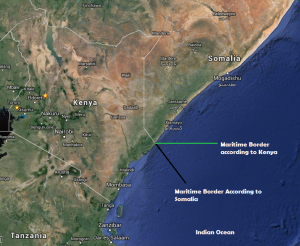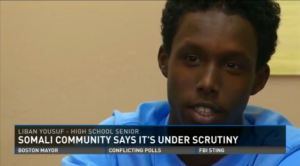Seattle Somalis Worry Arrests Could Hinder How They Send Home Money
 A Somali immigrant living in Kent was arrested Wednesday on charges of fundraising for the Somali insurgent group Al-Shabaab. Her arrest could cast more suspicion on the system Somalis use to send money home.
A Somali immigrant living in Kent was arrested Wednesday on charges of fundraising for the Somali insurgent group Al-Shabaab. Her arrest could cast more suspicion on the system Somalis use to send money home.
The case against Hinda Osman Dhirane appears to hinge on a number of financial transactions. The transfers may link Dhirane to other defendants, in Virginia, The Netherlands, Somalia and Kenya. Money transfers are used every day by Somalis in Seattle, because there is no other way to get money to friends and family in Somalia. Now they are fearful of questions from federal investigators.
Hassan Diis has lived in Seattle for seven years. He finds the money transfer services quick and reliable – he can even send funds to people in refugee camps. Somali immigrants “care and are willing to help their families they can’t bring to the United States. So the easiest way to help them is to send them $50, $100” on a regular basis, he said. People also seek contributions when someone has had a crisis.
But he said this criminal investigation is “big news” and could make people reluctant to send any money home. “People feel the fear, you know. For example, the fed is coming to your door, saying, ‘Who are you sending this money, why do you send him, what are you related for,’ it’s a whole complicated scenario, you know?” Diis said.
Arsalan Bukhari with the Washington chapter of the Council on American-Islamic Relations said his group has received queries in the wake of Dhirane’s arrest on how local Somalis should handle questions from federal authorities.
“In those cases, our job is to make sure citizens know their rights, that they know they have the right to have an attorney present in interviews with the FBI,” he said.
But it’s not just individuals that are scared to use the money transfer system – banks are, too.
Scott Paul, senior humanitarian policy advisor for Oxfam America, said Somali immigrants send $1.3 billion dollars home every year – that accounts for roughly a third of the country’s economy.
Customers send and receive the funds through Somali companies, but established banks are required to help complete the wire transfers. And Paul said very few are willing to do so.
“Under pressure from government officials, particularly from the U.S. government, these banks are pulling out of this business,” he said.
If the system collapses, Paul said people in Somalia will be even more dependent on foreign aid. And it probably won’t be good news for law enforcement either.
“Families will try to find ways outside the formal system to support their relatives,” he said. “And as soon as that money goes underground, it’s impossible for regulators to trace it, it’s impossible for law enforcement to trace it, and it’s much, much more vulnerable to diversion from criminal networks.”
As for the accused conspirator Hinda Osman Dhirane, her next hearing is scheduled for Tuesday. She could then face trial in federal court in Virginia, where the case originated.
Laurie Levinson, who teaches criminal law at Loyola Law School in Los Angeles, said the small dollar amounts of the money transfers mentioned in the indictment – many just $100 – could make the case look like “low-hanging fruit.” But Levinson said federal authorities have taken a tough approach on any funding believed to be linked to terrorism. Levinson said the case may be intended to send a message, and could help force others involved to cooperate.
Source: KUOW
Comments
comments
 Calendar
Calendar






































